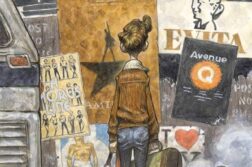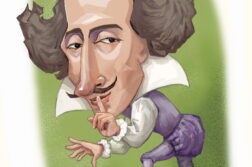Back With a Vengeance Tour
Performed by Dame Edna
… and backstage with the artist
DAME EDNA EVERAGE is the only Tony Award-winning star who quizzes the audience and insults what they wear. Galumphing about the stage in a sensationally outré gown, purple hair and rhinestone-winged glasses, she razzes latecomers and asks them to identify themselves.
Dame Edna, the wildcard creation of Barry Humphries, disarms in order to delight. She’s a comic terrorist in the guise of a provincial matron from Australia. Her roguish act is premised on the antic chaos that ensues when she attacks with reckless abandon—and then openly asserts her innocence. “I mean that in a kind, caring way,” Dame Edna is given to reiterating. Her mouth twitches in mock anxiety at her cutting comments, the timbre of her voice lowered in false intimacy, while her reassuring words and cooing voice only reinforce the spirit of intimidation.
“I was born with the priceless gift of laughing at the misfortunes of others,” she confided in a cozy tête-à-tête at Sardi’s Restaurant in New York City. “And, do you know? That keeps me cheerful 24 hours a day. I’ve got diplomatic immunity to say what I like—even the truth.” Looking like a train-wreck of extravagant femininity, Dame Edna isn’t very good at convincing you that she isn’t a he. She’s got the neck, shoulders and gait of a linebacker. Showing up for our rendezvous in a lime-green, seven-pointed Statue-of-Liberty headdress and a body-hugging, Day-Glo-colored gown (with Lady Liberty again painted on it), she almost looked Photo-Shopped. “I’m not what you call a beauty, but I have a lovely bone structure,” she ’fessed up. “I’m very well preserved. I’m at the height of my powers, according to my gynecologist. Some men find me raunchy. But I don’t think of myself as a beauty, any more than I would have thought little Celine Dion is a beauty or Madonna. In many ways you can say they are plain, ugly, even hideous. But I’m beautiful inside. I think it’s what I radiate that people love.” In today’s star-hyped culture, Dame Edna exists for the sake of others: the little people in the cheap seats whom she refers to as “paupers” and the nonentity fans she affectionately calls “my possums.” Between her 1999 Tony-Award-winning debut (dubbed The Royal Tour) and her current reprise four years later—Back With a Vengeance—Dame Edna has crisscrossed the U.S., seeking to win American hearts. To celebrate her 50th anniversary in show business, she is returning this spring to Sydney and Melbourne where the Victorian Arts Centre has created an amazing retrospective called “Virtually Edna,” complete with podcasts. “It must be awful to have an international laughingstock as your president,” she continued, “but you won’t be getting my pity. How insulting that would be, possums! You’ll just get my total support, because, let’s face it, I am a sort of female Dr. Phil on a cosmic scale.” A paragon of narcissism, Dame Edna burlesques the grandiosities of the media spotlight. But the joke here is that, although fame and fortune fly around her surreal orbit, she has crossed the cordons and now walks the same red carpet as the movie stars, politicians, sports figures and rock ’n’ roll legends whom she so freely puts down onstage. Claiming woman in the world today, she is celebrity-hood run amok. Here she is playing a purple-haired plaintiff on the TV series Ally McBeal. There she is cavorting on a king-size bed with Sharon Osbourne and Victor Webster (wearing only a pair of boxer shorts) on the hit reality show The Osbournes. “I brought a little gift for you from Australia,” Edna told Webster, the hunky star of the sci-fi series Mutant X. This is a kangaroo scrotum made from a little wobbly bit.” In a world in which the lines between fiction and reality have blurred, the power and gravity of Dame Edna turn the Newtonian notion of celestial attraction inside out. And because her modus operandi is to deride and conquer, her presence poses a real existential conundrum: How does she fit into known variables? Is she a drag act? a clown? a dandy? a performance artist? a larger-than-life obelisk of female grotesquerie? One thing’s for sure: Dame Edna won’t tell. An impresario of come-hither seduction followed by quick denial, she retorts: “Drag acts? I’ve heard of them. Mostly I think they’re from broken homes.” “I remember one night in London years ago,” she recalled, “and all I saw was a pair of eyes looking at me while I was on stage. I said to someone in the theatre, ‘There’s been a man for six nights in the second row, and all I could see are his eyes peeping. What’s he doing?’ I was told, ‘Oh, that’s Mr. Dustin Hoffman.’ Well, does it surprise you that a few months later he released a film called Tootsie, which blatantly attempted to copy me? I was therefore not at all surprised when, over a decade later, little Robin Williams was skulking around my theatre. Skulking is the only word. If you’re reading this, Robin, that’s the only word I can use. Well, surprise, surprise, he came out with Mrs. Doubtfire—another tragic attempt to clone me.” When I pointed out that Dame Edna is actually the invented persona of Barry Humphries, the man billed in the theatre program as “her business manager,” she feigned indifference. “All I can ask you to do is to read my latest gynecological report. All I can do is stand on the stage, and share with the audience my experience, my strength, and my hope. I know they assume I am my manager Barry Humphries dressed-up,” she confided. “You see, every successful woman is attacked by a certain group who think, ‘How can a woman be so successful and so amusing? She must be a man. So I think these people are exhibiting a homo-eccentric mentality.” She paused dramatically, as if startled by what just popped into her airhead. “I don’t know what that means, but it sounds good. It means that if an act is good, there has to be a man behind it.” That gibe is classic Dame Edna. It sounds smart—and makes absolutely no sense. As further proof of authenticity, Dame Edna mentions her three grown children: son Bruce, incompatibly married to Jocelyn; son Kenneth, a fashion designer; and daughter, Valmai, who settled down with a former female tennis star. “My son Kenny lives in Chelsea,” she told me, with pride. “He’s a very familiar figure on Eighth Avenue. He designs all my gowns. Now of course many others are requesting that he make frocks for them: Jerry Hall, Nicole Kidman (if she wears frocks), Lauren Bacall, Tom Cruise. I’ve written this song, ‘Friends of Kenny.’ Anyone who knows Kenny will love it.” When I asked if her lesbian daughter had survived shoplifter’s rehab, a cloud passed over Dame Edna’s face. “My daughter Valmai is estranged,” she said, sobbing. “She’s living somewhere in the outer boroughs of New York. We haven’t seen each other for 12 years. I’m prepared to forgive, to embrace that girl, to bury the past and embrace the future, although I would hate to meet her roommate, her ‘companion.’ Or what has come to be called her ‘partner,’ a word I simply can’t bear. ‘Partner,’” she scoffs. “Whenever someone says to me, ‘Please meet my partner,’ I say, ‘Business or pleasure?’” She paused again to catch her breath. This was her Barbara Walters moment. Wiping the crocodile tears from heavily mascara-ed eyes, Dame Edna grabbed the tape recorder from my hand and held it to her lips. “Valmai,” she said. “If you’re reading these words, your mother needs you at the theatre. I plead with you. There will be two tickets for you—to pay for—at the box office on the first night. But please wear something clean and feminine.” Never underestimate the power of a man in a dress. Dame Edna is a manipulative witch. Her relationship with the audience (as Barry Humphries has explained) is “a sort of perversion of love. She doesn’t exactly love them, but she forgives them. I would describe it as satanic benediction. She sends them out with her equivocal blessing.” As fast with the putdown as she is quick to heave bunches of gladioli into the audience, she treads perilously between common sense and effrontery, pretense and insolence—a vicious critter loudly proclaiming her saintliness. And we’re helpless with laughter. Randy Gener, senior editor of American Theatre magazine, is the author of the two plays, including Love Seats for Virginia Woolf.




